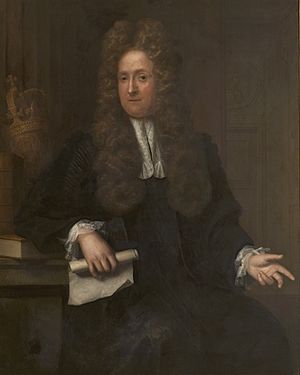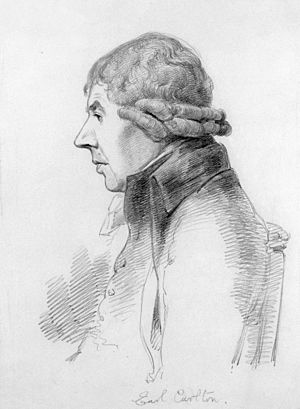Recorder of Cork facts for kids
The Recorder of Cork was an important legal job in Ireland before it became independent. The Recorder was like the main judge or leader for Cork city. Their most important job was to help keep the peace and make sure laws were followed.
This job was a lot like the Recorder of Dublin. However, the Recorder of Cork could not be in charge of trials for very serious crimes. A law from 1877 said that the Recorder should also be the leader of the Cork East Riding Quarter Sessions, which were special court meetings.
Being the Recorder of Cork was a busy job. The court met at least twice a week. Usually, the Recorder had a helper called a Deputy Recorder. For example, William Waggett, who started in 1808, let his helper Mr. Wilmot do most of the work until Mr. Wilmot passed away in 1815.
Sometimes, the Recorder of Cork also had another important legal job, like being a special lawyer for the King (called a King's Serjeant-at-law). Many Recorders of Cork were also members of the Irish House of Commons, which was like the parliament back then. They might even have another local job, such as collecting taxes on goods coming into the Port of Cork.
Unlike some other jobs, the Recorder was chosen by the Cork City Corporation (the city's government), not by the English Crown (the King or Queen of England). Two Recorders of Cork, Henry Bathurst and William Worth, also worked as the Recorder of Kinsale in the 1660s and 1670s.
The first time we hear about the Recorder of Cork job is in a special document from Queen Elizabeth I in 1574. This document said that the Recorder (John Meade or Meagh) had to act as a "keeper of the peace." This meant he helped keep order and made sure people who broke the rules were brought to justice.
In 1906, something unusual happened. Mr. Tristram Curry, who worked for the Recorder, left Cork after taking a lot of money that belonged to people in court. This event was even recorded in Hansard, the official journal of the British House of Commons.
The job of Recorder of Cork, along with other similar jobs in the Irish Free State, ended in 1924.
Contents
Famous Recorders

Many important people held the job of Recorder of Cork:
Early Recorders
- John Meade (living in 1574) was the first known Recorder. He later became a judge in the Munster area and was also a member of the Irish House of Commons for Cork City in 1559 and 1585. He was a lawyer from Lincoln's Inn in London. His family later became important noble families.
- William Meade (died after 1611) was probably related to John Meade. He got into trouble in 1603 for not announcing the new King James I of England. He was tried for serious disloyalty but was found innocent. He later left Ireland and died in another country.
- Henry Bathurst (1623-1676) came from a large family in England. He was also the Recorder of Kinsale.
- William Worth (around 1646–1721) came from a family of church leaders. His father was a bishop, and his brother was a dean. He was Recorder of Kinsale from 1676 to 1681 and Recorder of Cork from 1678 to 1681. He later became a judge in the Court of Exchequer (Ireland).
- Alan Brodrick, 1st Viscount Midleton (around 1656–1728) was Recorder from 1690 to 1695. He was one of the most important judges and politicians in Ireland at that time. He held many big jobs, including Speaker of the Irish House of Commons and Lord Chancellor of Ireland. He was known for having a bad temper.
18th and 19th Century Recorders
- Hugh Dickson MP (died 1738) was a member of the Irish House of Commons for Cork City from 1725 to 1735. He was Recorder from 1728 to 1738 and also collected taxes on goods.
- Hugh Carleton, 1st Viscount Carleton (1739-1826) was Recorder from 1769 to 1779. He came from a leading merchant family in Cork. He wasn't very successful as a politician, but he became a very good judge, serving as Chief Justice of the Irish Common Pleas.
- John Bennett (around 1720-1792) was Recorder from about 1783 to 1787. He was an important local politician and a member of the Irish House of Commons. He later became a judge in the Court of King's Bench (Ireland).
- Robert Bennett was Recorder from 1841 to 1847. He was mentioned as a Deputy Recorder in 1840. He kept a helpful notebook of the cases he heard. He was the father of a famous surgeon, Edward Hallaran Bennett, who discovered a type of bone fracture.
- William Waggett (1771-1840) was Recorder from 1808 to 1841. He was one of the most skilled lawyers of his time in Ireland, but he was also known for being a bit unusual.
- Matthew Bourke (1849–1926) was the last Recorder of Cork, serving from 1908 to 1924. A friend, Maurice Healy, wrote about him with great warmth in his book The Old Munster Circuit.
List of Recorders of Cork (1574–1924)

- John Meagh, or Meade (around 1570-74)
- William Meade (removed from office 1603)
- Benjamin Crofts (around 1665–1668)
- Henry Bathurst (died 1676)
- William Worth (1678–1681)
- Alan Brodrick, 1st Viscount Midleton (1690–1695)
- Hugh Dickson (appointed December 1728, still in office 1734)
- Joseph Bennett (1738-1767)
- Hugh Carleton, 1st Viscount Carleton (1769–1779)
- John Bennett (around 1783–1787)
- William Waggett (1808–1840)
- Robert Bennett (1841–1847)
- Thomas Forsyth, or Forsayth (1847–1879)
- James Hamilton (1880–1892)
- Sir John Chute Neligan (1892–1908)
- Matthew Bourke (1908–1924)
Deputy Recorder of Cork
- Robert Wilmot (1772-1815) was Deputy Recorder until he passed away in 1815. He was the brother of writers Katherine Wilmot and Martha Wilmot.
- Robert Bennett, who later became Recorder from 1841 to 1847, was a Deputy Recorder in 1840.
 | William M. Jackson |
 | Juan E. Gilbert |
 | Neil deGrasse Tyson |

